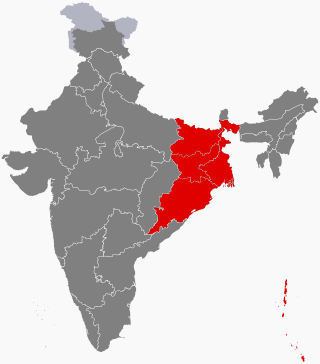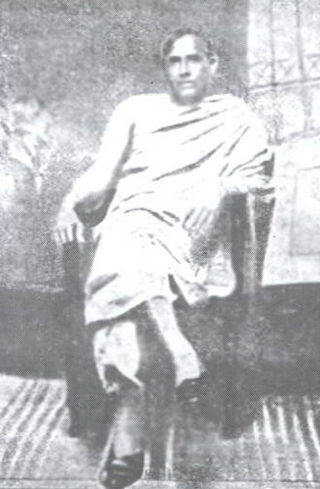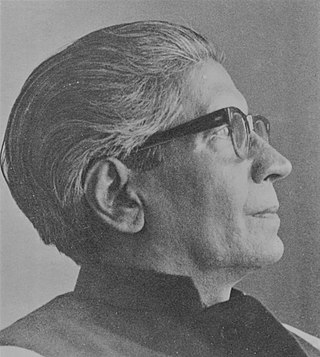
Kolkata is the capital of the Indian state of West Bengal, on the eastern bank of the Hooghly River 80 km (50 mi) west of the border with Bangladesh. It is the primary business, commercial, and financial hub of Eastern India and the main port of communication for North-East India. According to the 2011 Indian census, Kolkata is the seventh-most populous city in India, with a population of 45 lakh (4.5 million) residents within the city. It is a part of Kolkata Metropolitan Area which has a population of over 1.41 crore (14.1 million) residents making it the third-most populous metropolitan area in India. In 2021, the Kolkata metropolitan area crossed 1.5 crore (15 million) registered voters. The Port of Kolkata is India's oldest operating port and its sole major riverine port. Kolkata is regarded as the cultural capital of India. Kolkata is the second largest Bengali-speaking city after Dhaka. It has the highest number of nobel laureates among all cities in India.
Gupta is a common surname or last name of Indian origin. It is based on the Sanskrit word गोप्तृgoptṛ, which means 'guardian' or 'protector'. According to historian R. C. Majumdar, the surname Gupta was adopted by several different communities in northern and eastern India at different times.

Jadavpur is a southern neighbourhood of Kolkata in the district of Kolkata of West Bengal, India. Jadavpur is one of the important junctions in South Kolkata. Jadavpur University and a number of research institutes of national and international repute are located in Jadavpur.

East India is a region of India consisting of the Indian states of Bihar, Jharkhand, Odisha and West Bengal and also the union territory of the Andaman and Nicobar Islands. The region roughly corresponds to the historical region of Magadha from which it inherits its various Eastern Indo-Aryan languages.

Nabaneeta Dev Sen was an Indian writer and academic. After studying arts and comparative literature, she moved to the USA where she studied further. She returned to India and taught at several universities and institutes as well as serving in various positions in literary institutes. She published more than 80 books in Bengali: poetry, novels, short stories, plays, literary criticism, personal essays, travelogues, humour writing, translations and children's literature. She was awarded the Padma Shri in 2000 and the Sahitya Akademi Award in 1999.

Chidananda Das Gupta —family name sometimes spelled 'Dashgupta' and 'Dasgupta'—was an Indian filmmaker, film critic, a film historian and one of the founders of Calcutta Film Society with Satyajit Ray in 1947. He lived and worked in Calcutta and Santiniketan.

Rimi Barnali Chatterjee is an Indian author and professor of English at Jadavpur University.

Sukanta Chaudhuri is an Indian literary scholar, now Professor Emeritus at Jadavpur University, Kolkata. He was educated at Presidency College, Kolkata and the University of Oxford. He taught at Presidency College from January 1973 to December 1991 and at Jadavpur University thereafter till his retirement in June 2010. At Jadavpur, he was founding Director of the School of Cultural Texts and Records, a pioneering centre of digital humanities in India. His chief fields of study are the English and European Renaissance, translation, textual studies and digital humanities. He has held visiting appointments at many places including All Souls College, Oxford; St John's College, Cambridge; the School of Advanced Study, London; University of Alberta, University of Virginia; and Loyola University, Chicago. He is an Honorary Fellow of the Asiatic Society, Kolkata and a member of the Executive Committee of the International Shakespeare Association. In July 2021, he was elected a Corresponding Fellow of the British Academy.

Tathagata Roy is an Indian politician who served as the Governor of Tripura from 2015 to 2018 and the Governor of Meghalaya from August 2018 to the end of his term in August 2020. He was the 6th president of West Bengal state unit of Bharatiya Janata Party from 2002 to 2006 and a member of the BJP National Executive from 2002 until 2015.
Rudrangshu Mukherjee is an Indian historian and author of several major history books. He was formerly the Opinions Editor for The Telegraph newspaper, Kolkata and the Chancellor for Ashoka University, where he also serves as Professor of History. He was the founding Vice-Chancellor of Ashoka when the University began in 2014 and was succeeded in 2017 by Pratap Bhanu Mehta.
Rabindra Kumar Das Gupta was an Indian scholar of Bengali and English literature and a social and cultural commentator. He was considered by his peers as one of the last scholars with equal command of English and Bengali languages.

Swapan Kumar Chakravorty was an Indian academic who was a distinguished Professor of Humanities at the Presidency University, Kolkata. He also served as a Professor of English, Jadavpur University, Director General of the National Library of India along with Secretary, and Curator of the Victoria Memorial Hall. Chakravorty was chairperson of the Centre for Studies in Social Sciences, Calcutta (CSSSC), Advisor to the Vice-Chancellor on Library Matters, Ashoka University, and Distinguished Visiting Faculty, S. P. Jain School of Global Management.
Susobhan Chandra Sarkar (1900–1982) was an Indian historian.

Jatindra Nath Banerjee was one of two great Indian nationalists and freedom fighters – along with Aurobindo Ghosh – who dramatically rose to prominence between 1871 and 1910.
Shiv K. Kumar was an Indian English-language poet, playwright, novelist, and short story writer. His grandfather late Tulsi Das Kumar was a school teacher and his father Bishan Das Kumar, was a retired headmaster. The letter 'K' stands for Krishna, i.e. Shiv Krishna Kumar.
Malabika Sarkar is an Indian academic, former Vice-Chancellor of Ashoka University, and a former Vice Chancellor of Presidency University, Kolkata. She was the first Dean of Faculty & Research at Ashoka and was the Principal Academic Advisor before succeeding Pratap Bhanu Mehta to become the 3rd Vice-Chancellor. She is a professor of English Literature and specializes in John Milton, with an added interest in the History of Science. Her book Cosmos and Character in Paradise Lost was published by Palgrave Macmillan in June 2012. She stepped down as Vice Chancellor on 10 November 2022.
Subodh Chandra Sengupta was an Indian scholar, academic and critic of English literature, known for his scholarship on Shakespearean works. His books on William Shakespeare, which included Aspects of Shakespearian Tragedy, Shakespearian Comedy and Shakespeare's Historical Plays are critically acclaimed for scholarship and academic rigor. He was a professor in the Department of English Language and Literature at Presidency College, Calcutta, and after retirement from Presidency College, became Professor of English Language and Literature at Jadavpur University, Calcutta, as well as a professor of English literature at Ramakrishna Mission Residential College, Narendrapur, an autonomous college in Greater Calcutta under the University of Calcutta. The Government of India awarded him the third highest civilian honour of the Padma Bhushan, in 1983, for his contributions to literature and education.

Abu Sayeed Ayyub was an Indian philosopher, teacher, literary critic and writer in both Bengali and English. Though born into a traditional, Urdu-speaking, Muslim family in Calcutta (Kolkata), he was so deeply captivated in his early teenage by the poems of the Indian Nobel Laureate Rabindranath Tagore that he taught himself Bengali so as to appreciate Tagore better. Later, when he started to write, it was mostly in his adopted language, Bengali. During the initial part of his writing career, Ayyub wrote on aesthetics, religion and socialism. However, it was his philosophical and scientific analysis of creative literature - in particular the poetry and the drama of Tagore - that finally brought him wide recognition as "one of the most serious and original Tagore scholars". Ayyub is also credited with "co-editing the first anthology of modern Bengali poetry". He taught philosophy at the University of Calcutta, the Visva-Bharati University and the University of Melbourne, and edited the literary and philosophical journal Quest.











